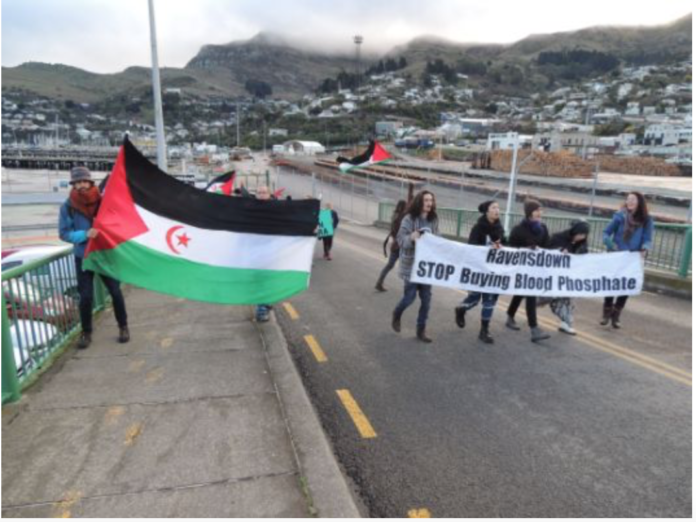Free Western Sahara Solidarity Aotearoa had a successful protest action against Ravensdown to coincide with the arrival of the Trans Spring vessel into Lyttleton Port today. The Trans Spring is carrying thousands of tonnes of stolen ‘blood phosphate’ from the occupied territory of Western Sahara.
A group of concerned local citizens gathered today to peacefully protest and register their discontent with Ravensdown funding human rights violations in the occupied territory of Western Sahara. Spokesperson Josie Butler stated “Ravensdown damages the international reputation of New Zealand by continuing to import from the occupied territory. They are funding war crimes”.
The protestors blockaded trucks carrying the stolen “blood phosphate”, rebranding the vehicles with signs that said “Stolen Goods”. The police helped facilitate this action by supporting the protestors in stopping the trucks safely.
Yesterday local activists in Dunedin blockaded the Ravensdown factory for most of the day, stopping all trucks from being able to leave the facility. This was to protest the arrival of the Trans Spring in New Zealand domestic waters.
Last night the Rail and Maritime Union (RMTU) delivered a letter of protest to the Captain of the Trans Spring, condemning Morocco’s illegal occupation of Western Sahara and calling on the New Zealand Government to halt all importation of phosphate from the area. This follows the New Zealand Council of Trade Union’s resolution that was passed last year standing in solidarity with the people of Western Sahara.
Last week the representatives for Western Sahara started an action in the High Court taking the Guardians of the New Zealand Super Fund to court, calling for a judicial review of its investments in businesses with links to Western Sahara’s exploited resources.
The money Ravensdown contributes to Morocco goes towards funding the 10 million land mines, which lie along the border of Western Sahara, forbidding the local Saharawi from ever returning to their home land. The area is guarded by 150,000 military and police, which is a ratio of 15 military to every 1 Saharawi. New Zealand is directly funding war crimes by continuing to purchase phosphate from the illegally occupied territory of Western Sahara.
173,000 Saharawi have had to flee their homes, and are living in refugee camps in neighbouring Algeria.
The Saharawi people have never consented for their phosphate to be taken by Morocco, and have been demanding a referendum for self determination for over 30 years. The UN and the African Union support their calls for referendum, which are being refused by the occupying power of Morocco. The Saharawi want their natural resources protected, because they need them to rebuild their lives after decades of exile, conflict and suffering.
Ravensdown has been accused by international authorities of misrepresenting the UN position by saying they are operating within their guidelines, when they have never sought the consent of the Saharawi people. The Western Sahara government in exile has never consented. OCP does not claim to have mined the phosphate with the consent of the people of the territory.
The Saharawi in the occupied territory are denied their right to self determination, they are denied civil and political rights, they are tortured, they are imprisoned without trial. The Moroccan government have implemented a media black out, and refuse to allow human rights observers to entire Western Sahara, to try and ensure these stories are never told.
In March 2017, 60 Saharawi took over a bus owned by OCP and threatened to self immolate in protest of the occupation and their lack of rights
Last year a ship carrying phosphate rock destined for New Zealand was detained in South Africa and its courts ruled that the cargo was stolen from the people of Western Sahara. A boat was also detained in Panama for the same reason.
Western Sahara was invaded by Morocco in 1975. 176,300 people are still living in refugee camps in neighbouring Algeria despite a UN peace plan that proposed a referendum for Western Sahara’s independence in 1991. A plan, that is on hold due to the Moroccan occupier’s intransigence. The Saharawi people are separated from their homeland by a 2700km sand wall, ‘the berm’, personned by up to 100,000 soldiers. “The occupation is brutal” said Josie Butler, spokesperson for the Otautahi group, “I think the people of Christchurch would be horrified to know that a local business is funding such an injustice.”
The people of Western Sahara are calling for Ravensdown Ltd and Ballance Agri-Nutrients to “stop stealing their future”. The two NZ fertiliser cooperatives are the last two companies, in the western world, that still import from the occupied region. Western Sahara’s Representative to Australia and New Zealand, Kamal Fadel says that the phosphate trade funds the occupation and also signifies “de-facto recognition” of Morocco’s claim to the territory.





